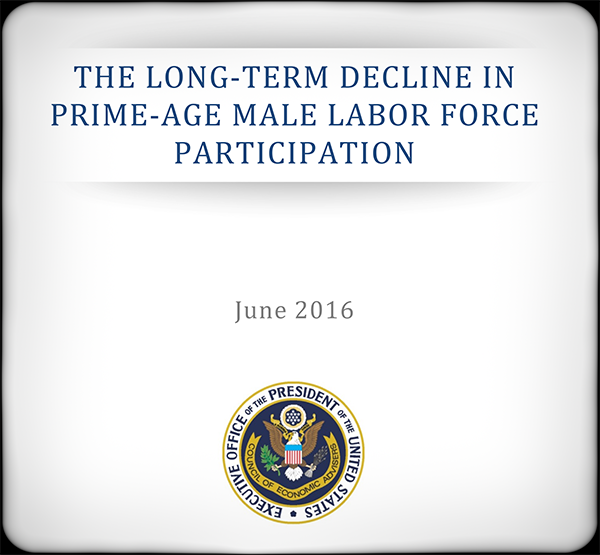The White House Council of Economic Advisers (CEA) released a new report this week on the long-term decline of work among men ages 25 to 54. Although it contains some interesting insights, the report's specific treatment of immigration is weak and contradictory. Let's start with the CEA's primary explanation for why men have been dropping out of the labor force:
The prime-age male labor force participation rate has been falling in the United States for more than half a century…. No single factor can fully explain this decline, but analysis suggests that a reduction in the demand for less skilled labor has been a key cause of declining participation rates as well as lower wages for less skilled workers. [Emphasis added.]

The authors argue that because low-skill wages have declined over time, demand for such labor must have fallen. Strangely, they do not mention that buttressing the supply of low-skill workers (via immigration) would also have a wage-depressing effect. In fact, the report absolves immigration of any responsibility for labor-force dropout because immigrants themselves have high rates of work, ignoring the possibility that immigrants are pushing natives out.
Stranger still, the authors never explain how low-skill immigration fits with their thesis. After all, if employers are much less interested in unskilled labor, why has the U.S. been a consistent magnet for unskilled immigration for the past half century, and why do those immigrants have such high rates of work? The simplest answer would be that immigrants are willing to work for less money than natives. Is the Obama administration okay with lowering the prevailing wage through immigration?
Even more strangely, the administration usually argues that amnesty and guest workers are needed to satisfy the high demand for unskilled labor. For example, here is a quote from an earlier White House report on the need for more immigration to support domestic agriculture:
In recent years, farmers and ranchers in various parts of the country have often reported difficulties in securing sufficient workers for critical tasks.... About three fourths (77 percent) of the respondents indicated that a lack of available workers had led them to contract the size and/or scope of their businesses. [Emphasis added.]
So we need more immigrants to meet the high demand for unskilled workers, but natives are dropping out of the labor force because of the low demand for unskilled workers. Is everyone clear on that?
The strangest part of the report is the authors' recommendation that we increase immigration, even though they acknowledge that immigration would do nothing to "directly" address the problem the report focuses on – namely, that people with low levels of education are dropping out of the labor force. In fact, they portray immigrant replacement of natives in the labor force as a benefit:
Immigration reform would raise the overall participation rate by bringing in new workers of prime working age, offsetting some of the macroeconomic challenges associated with the long-run decline in prime-age male participation.
But if we are serious about getting low-skill natives back to work, why not remove the crutch of immigration? Without immigration to offset the challenges of native dropout, politicians and business owners would take a much greater interest in getting natives back to work. As I explained in a recent op-ed for The American Conservative, increasing immigration is one of the most counter-productive policies that someone with an interest in helping low-skill natives could advocate.
Much of the confusion in the CEA report is due to the simple unwillingness of the administration to ever say anything negative about immigration. Whether there is low demand or high demand for unskilled labor, the White House's policy prescription is the same: More immigrants.
Jason Richwine is an independent public policy analyst and contributing writer to National Review.
